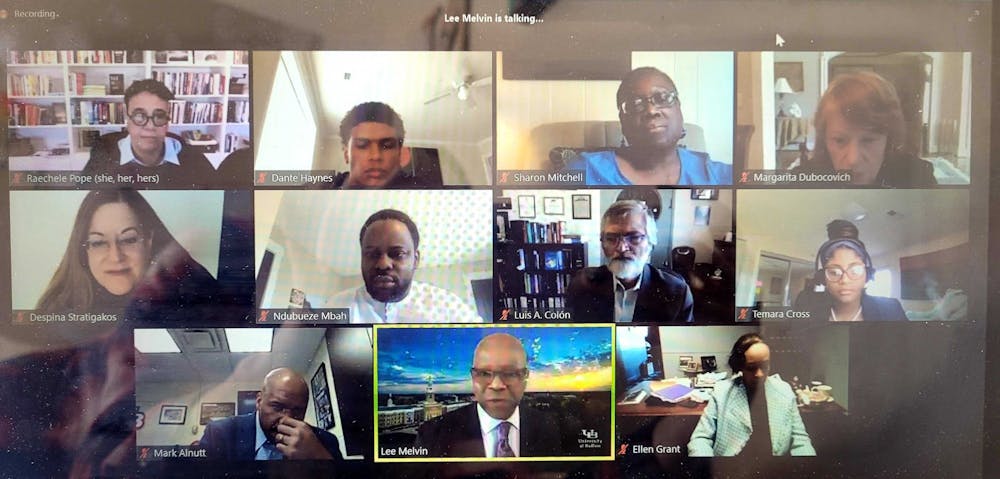The UB President’s Advisory Council on Race offered its first virtual public forum Monday.
The 1 ½ hour conversation about the council’s recommendations to counter UB’s systematic racial inequalities drew a crowd of over 500 students, staff, faculty and alumni through Zoom, inviting questions, criticisms and debate from the audience.
The conversation reaffirmed UB’s commitment to make good on its promise to stand with students of color and re-amplified previously unanswered calls for UB to hire more Black faculty, invest in the recruitment and retention of minority students and fund Black studies programs, among other initiatives.
UB President Satish Tripathi first convened the race-focused council last summer to lead “discussions on issues of race and culture to guide UB’s programs, policies, activities and traditions.” The council targets racially-based structural inequalities through four “focus areas”: faculty and staff recruitment, hiring and retention; student recruitment, admissions, retention and graduation; curriculum and teaching; and community.
During the meeting, the council’s subcommittees took turns presenting their recommendations for a more racially-inclusive and equitable community. Afterward, Vice Provost for Inclusive Excellence Despina Stratigakos moderated a Q&A session.
The council’s new “collective” approach will call on the entire UB community to “show up” and “contribute” to enacting and enforcing the councils policy recommendations, Stratigakos said.
“The recommendations and their implementation will be far-reaching,” Stratigakos said. “Not showing up, figuratively or literally, is not an option in the long-term because our approach will be collective. As was stated today, this initiative goes to the heart of our mission as educators and good community neighbors. All of us have a role to play in that mission and will be called upon to contribute.”
The faculty and staff recruitment, hiring and retention group was the first committee to present. Its members highlighted UB’s underperformance in faculty diversity in comparison with other Association of American Universities (AAU) institutions. The council noted that UB is ranked lowest out of its eight peer institutions in the hiring of Black and Hispanic faculty.
The subgroup recommended increasing diversity within UB’s departments by establishing committees to review hiring, tenure and promotion granting, revising the faculty mentoring policy and implementing institution-level accountability to uphold diversity standards.
The curriculum and teaching subgroup’s working recommendations, meanwhile, called for all UB students to take a mandated anti-racism course and requested that the school incorporate diversity and inclusion themes in its general education program. The subgroup also recommended developing an Underrepresented Researchers of Color Program, so that minority students can have priority access to education funding.
The subgroup on student admissions, recruitment, and graduation emphasized the university’s need to create a more welcoming and supportive university community by identifying and building upon existing successful diversity programs. The group also recommended continuing to utilize holistic admissions practices and publishing diversity-related data concerning the university and University Police.
The community subgroup was the final one to present. This group argued that officials need to cultivate trust between the university and its surrounding community. They said this can best be accomplished by evaluating gaps in the university’s community service, increasing funding to successful community engagement programs and instilling a campus-wide social justice and inclusion reporting structure.
UB officials opened the floor to questions from the audience in a 40 minute Q&A session moderated by Stratigakos. The majority of the questions focused on the scope of the council’s influence and what considerations the group had made given its decision not to collaborate with SUNY on the effort.
One audience member expressed concern that the council’s recommendations were politically rooted in a “liberal agenda.”
Council members Raechele Pope and Lee Melvin disputed that claim, stressing the council shares strictly non-partisan goals.
“I didn’t see it, and I don’t hear my committee see it as a partisan issue,” Pope said. “We were talking specifically about racism and anti-racism, and I have a very hard time understanding that as a partisan issue.”
Melvin also chimed in, explaining that the committee’s role is strictly apolitical and driven solely by its human rights agenda.
“If there is an agenda here, it is a human rights agenda, it’s a human equality agenda,” Melvin said. “We did not approach this as a political type agenda, but it’s convenient to label things liberal, conservative, etc. But our committee really was focused on what might be the student experience here.”
The council, which was formed in response to Black Lives Matter demonstrations over the summer, will remain a permanent body of the Office of the President and continue to research and recommend policies for the university.
More information on the advisory council’s activity and a recording of the webinar can be found here.
The news desk can be reached at news@ubspectrum.com





